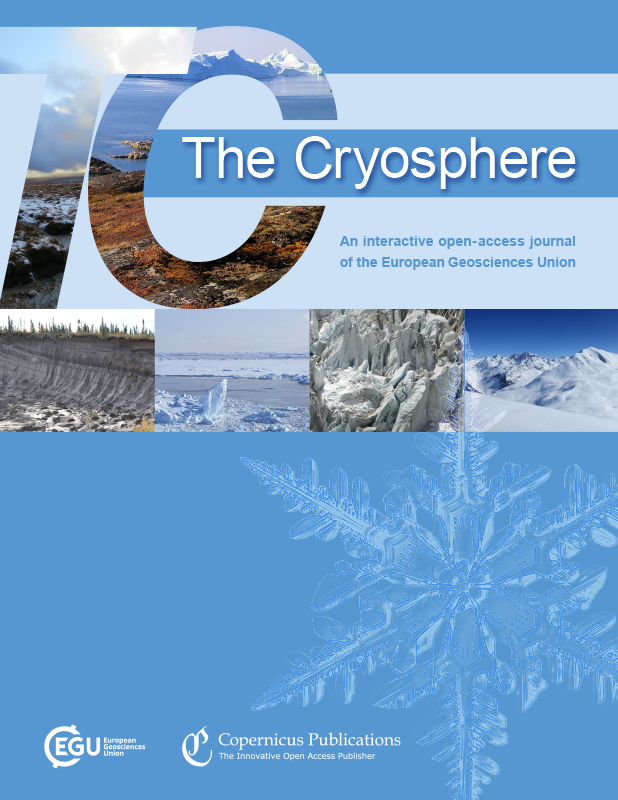Simulating the Laurentide Ice Sheet of the Last Glacial Maximum
IF 4.4
2区 地球科学
Q1 GEOGRAPHY, PHYSICAL
引用次数: 1
Abstract
Abstract. In the last decades, great effort has been made to reconstruct the Laurentide Ice Sheet (LIS) during the Last Glacial Maximum (LGM; ca. 21 000 years before present, 21 kyr ago). Uncertainties underlying its modelling have led to notable differences in fundamental features such as its maximum elevation, extent and total volume. As a result, the uncertainty in ice dynamics and thus in ice extent, volume and ice stream stability remains large. We herein use a higher-order three-dimensional ice sheet model to simulate the LIS under LGM boundary conditions for a number of basal friction formulations of varying complexity. Their consequences for the Laurentide ice streams, configuration, extent and volume are explicitly quantified. Total volume and ice extent generally reach a constant equilibrium value that falls close to prior LIS reconstructions. Simulations exhibit high sensitivity to the dependency of the basal shear stress on the sliding velocity. In particular, a regularised Coulomb friction formulation appears to be the best choice in terms of ice volume and ice stream realism. Pronounced differences are found when the basal friction stress is thermomechanically coupled: the base remains colder, and the LIS volume is lower than in the purely mechanical friction scenario counterpart. Thermomechanical coupling is fundamental for producing rapid ice streaming, yet it leads to a similar ice distribution overall.最后一次冰川盛期Laurentide冰盖的模拟
摘要在过去的几十年里,人们付出了巨大的努力来重建最后一次冰川盛期(LGM;约21 000年前,21 kyr ago)。其建模的不确定性导致了其最大海拔、范围和总体积等基本特征的显著差异。因此,冰动力学以及冰的范围、体积和冰流稳定性的不确定性仍然很大。本文中,我们使用高阶三维冰盖模型来模拟LGM边界条件下的LIS,用于许多不同复杂度的基础摩擦公式。它们对劳伦蒂德冰流、形态、范围和体积的影响被明确量化。总体积和冰的范围通常达到一个恒定的平衡值,该值接近之前的LIS重建。模拟表明,基底剪切应力对滑动速度的依赖性具有很高的敏感性。特别是,就冰体积和冰流真实性而言,正则库仑摩擦公式似乎是最佳选择。当基底摩擦应力是热机械耦合时,会发现明显的差异:基底保持较冷,LIS体积低于纯机械摩擦场景中的对应物。热机械耦合是产生快速冰流的基础,但它会导致类似的冰分布。
本文章由计算机程序翻译,如有差异,请以英文原文为准。
求助全文
约1分钟内获得全文
求助全文
来源期刊

Cryosphere
GEOGRAPHY, PHYSICAL-GEOSCIENCES, MULTIDISCIPLINARY
CiteScore
8.70
自引率
17.30%
发文量
240
审稿时长
4-8 weeks
期刊介绍:
The Cryosphere (TC) is a not-for-profit international scientific journal dedicated to the publication and discussion of research articles, short communications, and review papers on all aspects of frozen water and ground on Earth and on other planetary bodies.
The main subject areas are the following:
ice sheets and glaciers;
planetary ice bodies;
permafrost and seasonally frozen ground;
seasonal snow cover;
sea ice;
river and lake ice;
remote sensing, numerical modelling, in situ and laboratory studies of the above and including studies of the interaction of the cryosphere with the rest of the climate system.
 求助内容:
求助内容: 应助结果提醒方式:
应助结果提醒方式:


